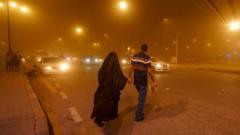Health officials in Iraq have reported that a sandstorm has caused respiratory distress in over 1,000 individuals, highlighting ongoing environmental challenges and the increasing frequency of such weather events attributed to climate change.
Rising Sandstorm Crisis in Iraq Leaves Thousands Struggling to Breathe

Rising Sandstorm Crisis in Iraq Leaves Thousands Struggling to Breathe
A recent sandstorm in Iraq has resulted in severe respiratory issues for over a thousand individuals, prompting concerns over environmental factors and healthcare responses.
A severe sandstorm has swept through central and southern Iraq, resulting in more than a thousand people suffering from respiratory problems, as reported by health officials across the country. In Muthanna province alone, officials stated that at least 700 individuals experienced severe suffocation symptoms. Disturbing footage from the area showed streets engulfed in a thick orange haze, contributing to poor visibility and leading to power outages and flight suspensions in multiple regions.
Dust storms, though commonplace in Iraq, are reportedly becoming more frequent—potentially linked to the impacts of climate change. The Iraqi environment ministry has also cautioned that the nation could experience an increase in "dust days" moving forward. In response to the adverse conditions, both pedestrians and police donned face masks to mitigate exposure to the harsh dust while paramedic teams were deployed to assist those in respiratory distress.
Hospitals across several provinces were inundated with patients: over 250 in Najaf, approximately 322 in Diwaniyah—which included children—and another 530 reported breathing difficulties in Dhi Qar and Basra provinces. The extreme sandstorm cloaked the southern regions of Iraq, significantly reducing visibility to below one kilometer (0.62 miles). Consequently, local authorities made the decision to close airports in Najaf and Basra to ensure public safety.
Weather forecasts indicate that conditions are expected to improve gradually by Tuesday morning. However, these ongoing environmental issues underscore Iraq's vulnerability, as the United Nations recognizes the country as one of the top five most at-risk nations regarding climate change, exacerbated by a history of severe sandstorms, extreme heat, and water shortages. A comparable event in 2022 resulted in one death, with more than 5,000 individuals requiring medical assistance for respiratory ailments. The recent sandstorm serves as a grim reminder of the urgent need for substantial environmental policy changes and healthcare adaptations in Iraq.





















